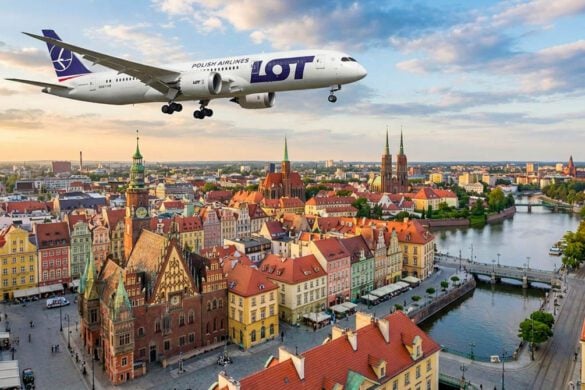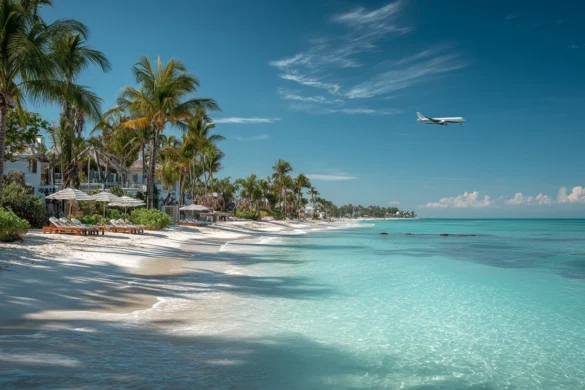Ever wonder why hostels in Europe aren’t the budget-friendly option they used to be? Yeah, me too. On my last trip through Europe, from the bustling streets of Barcelona to the cozy corners of Krakow, I was honestly shocked by the prices. What used to cost me 20-25 euros for a dorm bed is now hitting 40-50 euros in major cities.
The situation’s gotten way worse since I first started backpacking. In Paris, some “premium” hostels are charging 180 euros per night, which is basically hotel pricing. Even Amsterdam has seen a crazy 65% price jump since 2023. So what’s really driving these insane costs? It’s not just about post-pandemic recovery anymore. There’s a bunch of factors making hostels stupidly expensive, and honestly, some of it’s pretty frustrating
- Read also: The Absolute Coolest Hostels in Europe
Why Hostels in Europe Are So Expensive (and How to Save in 2025)
Trying to figure out why your hostel budget isn’t stretching like it used to in Europe? You’re not alone…and trust me, I’ve been there. Here’s a rapid-fire breakdown of why prices are skyrocketing and what’s really going on behind the scenes. Tap any section below to dive into the details.
- Worst Post-Pandemic Fallout: The catastrophic effect of the pandemic for hostels in Europe
- Biggest Price Bomb: The premium hostel trend
- Most Alarming Industry Shift: Corporate chains vs independent hostels
- Biggest Disruption from Nomads: Digital nomad demand driving long-term stays
- Most Brutal Cost Spike: Inflation and economic factors
- Most Unexpected Culprit: The Airbnb effect
- Sneakiest Price Trap: Seasonal variations
- Most Overlooked Cost Factor: Staff shortages and wage increases
- Hidden Expense Nobody Talks About: Rising energy costs
- Least Fun Part of Adulting: Regulatory changes and their impact
- Top Budget-Saving Hack List: Top tips for finding cheap hostels in Europe
There’s still a way to backpack Europe affordably…you just need to be savvier than ever. I’ve laid out everything I’ve learned so you can dodge overpriced dorms and find real value in 2025.
The catastrophic effect of the pandemic for hostels in Europe
To understand the state of affairs in the hostel industry today, we have to go back 4-5 years. The pandemic absolutely destroyed the hostel scene across Europe. I’m talking about permanent closures everywhere. An estimated 12.5% of hostels listed on Hostelworld closed their doors forever during 2020. Places like Retox in Budapest and Ginger Monkey in the High Tatras of Slovakia – both backpacker favorites – just disappeared.
This massive reduction in available hostels created a supply crunch that’s still biting us today. Fewer hostels means less competition, and guess what happens when demand bounces back? Prices go through the roof. I’ve noticed this firsthand – cities that used to have tons of hostel options now have maybe half as many.
The silver lining? New budget accommodations are slowly opening, but it’s taking forever. The resilience of the travel community gives me hope, but right now we’re still dealing with the aftermath of all those closures.

The premium hostel trend
Hostels aren’t what they used to be, and honestly, that’s both good and bad news. The whole industry’s going “premium” or “boutique,” which basically means they’re adding fancy amenities and charging hotel prices for what’s still shared accommodation.
Generator Hostels have added rooftop pools and fine dining to all their European properties. I stayed at their Barcelona location recently, and while the rooftop terrace was pretty awesome, I paid 65 euros for a dorm bed that would’ve been 25 euros at a basic hostel. Barcelona’s premium hostels are now adding wellness centers and coworking spaces too.
The thing is, these upgraded hostels do offer better experiences. Better security, cleaner facilities, more comfortable beds with privacy curtains and personal outlets. But they’re essentially pricing out the budget travelers who made hostel culture what it is. When a “premium” hostel in Paris costs 180 euros per night, you’re basically paying hotel rates for a shared room.
It’s creating this weird divide where you either stay at run-down budget places or pay premium prices for the nicer options. The middle ground is disappearing fast, and I’m not sure that’s great for backpacking culture.
Corporate chains vs independent hostels
Independent hostels are getting absolutely crushed right now, and it’s honestly sad to watch. Big corporate chains are using their economies of scale to engage in price wars that small hostels just can’t compete with.
These giants can afford to slash prices temporarily to drive out competition, then raise them once the independents close down. I’ve watched this happen in Amsterdam and Berlin over the past few years. The quirky, locally-owned hostels with character are being replaced by standardized chain properties.
Independent hostels operate on tiny margins, so when inflation hits or energy costs spike, they can’t absorb those increases like the big chains can. Many are forced to either sell to chains or close entirely. What we’re losing is the personality and local flavor that made certain hostels special.
The chains offer consistency and modern amenities, which some travelers prefer. But they’re also homogenizing the hostel experience. Every Generator or St. Christopher’s feels pretty similar whether you’re in London or Prague. That unique local vibe that made backpacking special is slowly disappearing, and honestly, that makes me pretty bummed out about where the industry’s heading.
✈️ My #1 Hack for Cheap 2026 Flights:
It’s January, so flight prices are climbing fast—but you don't have to pay them. I’m currently seeing roundtrips to Europe for under $300 (deals you won’t find on Google Flights).
Step 1: Join Going.com's Free Plan here. It takes 10 seconds and requires no credit card.
Step 2: If you're doing a big trip this year, grab the 14-day free trial of Premium. You can even use my code JON25 for 25% off.
Seriously, this is the single best money-saving tool I’ve used in 8+ years.
👉 Send me cheap 2026 flightsDigital nomad demand driving long-term stays
Remote work has completely changed who’s staying in hostels, and it’s driving prices up in ways most people don’t realize. Digital nomads aren’t your typical backpackers – they’re professionals who can afford to pay more for amenities like reliable Wi-Fi, quiet workspaces, and monthly rates.

I’ve noticed hostels across Europe are redesigning their common areas as coworking spaces. Amsterdam, Berlin, and Barcelona hostels now market themselves as “nomad hubs” with high-speed internet, printing services, and networking events. These aren’t just sleeping quarters anymore – they’re functioning as offices and creative incubators.
The crazy part? Digital nomads are willing to pay 40-50 euros per night for extended stays when traditional backpackers would balk at those prices. This higher-paying demographic is pushing out budget travelers who can’t compete with people booking month-long stays.
Hostels love this trend because nomads provide stable income and fill beds during off-peak seasons. But it’s fundamentally changing who hostels serve. Instead of catering to broke college students and gap-year travelers, they’re targeting working professionals with steady income streams. The result? Prices that reflect this more affluent customer base, leaving traditional budget travelers scrambling for alternatives.
Inflation and economic factors
Inflation hit Europe hard, and hostels are feeling every bit of it. In 2022, EU inflation peaked at a brutal 11.5%. Even though it’s dropped to around 2.1% by early 2025, the damage was already done. Hostel operators faced massive increases in everything – food supplies for breakfasts, laundry services, cleaning supplies, utilities.
The thing is, hostels operate on razor-thin margins. When their costs double, they can’t absorb those increases like big hotel chains can. They have to pass them directly onto us guests. I’ve talked to hostel managers who told me their electricity bills alone tripled in some cases.
The good news? With inflation finally cooling down, we might start seeing some price relief. But honestly, don’t expect prices to drop back to 2019 levels anytime soon.
- Read also: Europe’s Most Beautiful Cities in 2025

The Airbnb effect
Cities like Barcelona, Lisbon, and Florence are feeling the squeeze from short-term rental platforms. As more apartments get converted to Airbnb properties, it reduces the overall housing supply and cranks up competition for budget accommodations.
This puts hostels in a weird position. They’re among the few remaining budget-friendly options, so they can charge more. When I was in Lisbon recently, the change was obvious. Streets that used to be full of locals are now lined with tourist rental signs.
It’s honestly a frustrating situation. These platforms give travelers great options, but they’re also pricing out locals and driving up accommodation costs across the board. Some cities are fighting back with regulations, but the damage is already done in most major tourist destinations.
- Read also: My Favorite Sights in Barcelona

Seasonal variations
Traveling in peak season means paying premium prices – that’s just reality now. Summer in most European cities means hostel prices can easily double compared to off-season rates. I tried finding an affordable bed in Rome last August and it was like searching for a unicorn.
But it’s not just summer anymore. Christmas markets in Bruges, spring festivals in Vienna, or any major event can cause prices to spike dramatically. I’ve seen hostels in Amsterdam charge 100+ euros during King’s Day weekend when they’d normally be 35-40 euros.
The smart move? Travel off-peak whenever possible. Experiencing places like Paris in November can be just as amazing as spring, but with way fewer crowds and much better prices.

Staff shortages and wage increases
The hospitality industry is dealing with massive staffing issues across Europe. Hostels are struggling to find reliable staff, and they’re having to pay significantly more to attract workers. Many hostels that used to rely on volunteer programs or very low wages now need to offer competitive salaries.
I’ve stayed at hostels where the reception is only staffed during limited hours because they can’t find enough people to work. This shortage drives up labor costs, which inevitably gets passed on to guests through higher room rates.
The pandemic changed people’s attitudes toward hospitality work. Many former hostel workers found other jobs and aren’t coming back. This ongoing shortage means wage pressure isn’t going away anytime soon.
Rising energy costs
This one’s a huge factor that most travelers don’t think about. European electricity prices more than doubled between 2021 and 2022. Prices continued to go up during the Russia-Ukraine conflict. In Estonia, they jumped 323% – absolutely insane. Even though energy prices have stabilized somewhat in 2025, they’re still way higher than pre-pandemic levels.
For hostels, this means paying dramatically more to heat rooms, power Wi-Fi, run laundry facilities, and light common areas. When I stayed at a hostel in Tallinn recently, the manager mentioned energy costs as their biggest expense increase. All those “free” amenities we expect – Wi-Fi, kitchen access, common room heating – suddenly cost hostels a fortune to provide.
These costs get passed directly to guests. There’s really no way around it when you’re dealing with margin increases this massive.

Regulatory changes and their impact
European cities are getting serious about safety and sustainability regulations, which is great for guests but expensive for hostel operators. New rules about bed limits per room, fire safety requirements, and eco-friendly operations mean hostels need to invest in upgrades and compliance.
For example, many cities now require better ventilation systems, upgraded fire safety equipment, or limits on how many beds can be crammed into a room. I’ve noticed newer hostels generally have better facilities, but they’re also more expensive.
It’s a trade-off. We get safer, more comfortable accommodations, but we pay more for the privilege. Personally, I’m okay with this – sleeping in a properly ventilated room with good fire safety is worth the extra cost.

Top tips for finding cheap hostels in Europe
Even with all these price increases, you can still find decent deals if you know how to look:
- Book smart, not early or late. I know it sounds contradictory, but flexibility is key. Sometimes booking months ahead gets you better rates, other times last-minute deals work. Use price alert tools and be ready to jump on good deals.
- Stay longer for discounts. Most hostels offer weekly rates that can save you serious money. If you like a city, extending your stay often works out cheaper per night.
- Compare everything. Don’t just check one site. I always compare Hostelworld, Booking.com, and Hostels.com. Then I call the hostel directly – they often match or beat online prices to avoid paying commission fees.
- Go off the beaten path. Instead of staying in central Paris or Rome, look at smaller nearby towns with good public transport. You’ll save money and often get a more authentic experience.
- Consider membership programs. If you travel frequently, hostel chain memberships like Hostelling International can pay for themselves quickly with the discounts you’ll get.
FAQs about the high price of hostels in Europe
Looking for more info about the crazy high prices of hostels in Europe? Here are some questions I’ve been asked recently that I hope you’ll find interesting.
What’s the average cost of hostels in Europe now?
As of 2025, you’re looking at 25-60 euros per night for a dorm bed in Western Europe. Cities like Amsterdam, Paris, and London are on the high end, while Eastern European cities like Budapest and Prague still offer some relief at 15-35 euros.
Why are hostels so popular in Europe?
Europe’s got a long history of backpacking culture and inter-country travel. The continent’s compact size makes hostel-hopping between countries super easy. Plus, the social aspect of meeting fellow travelers has been embraced by young people for decades.

Are hostels still cheaper than Airbnb?
Generally yes, especially for solo travelers. Hostels offer shared dorms that cut costs significantly compared to renting entire Airbnb apartments. But for groups of 3-4 people, Airbnb can sometimes work out cheaper when you split the cost.
- Read also: My Favorite Airbnbs in Europe
Which booking site gives the best hostel deals?
It varies, but I always check Hostelworld and Booking.com first. Hostelz is great for comparing prices across multiple platforms. Pro tip: always check if you can book directly with the hostel – it’s often cheaper since they don’t pay commission fees.
The reality is that budget travel in Europe has fundamentally changed. The days of 15-euro dorm beds in major cities are mostly gone. But with some smart planning and flexibility, you can still explore Europe without breaking the bank – you just need to adjust your expectations and budget accordingly.

Global Viewpoint is a personal blog. All content is for informational and entertainment purposes only and does not constitute professional financial, medical, or legal advice.





